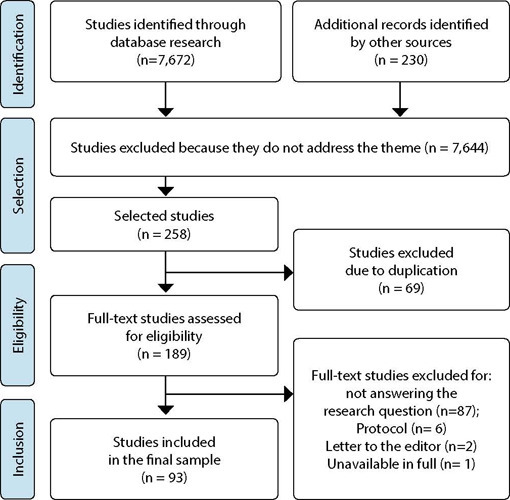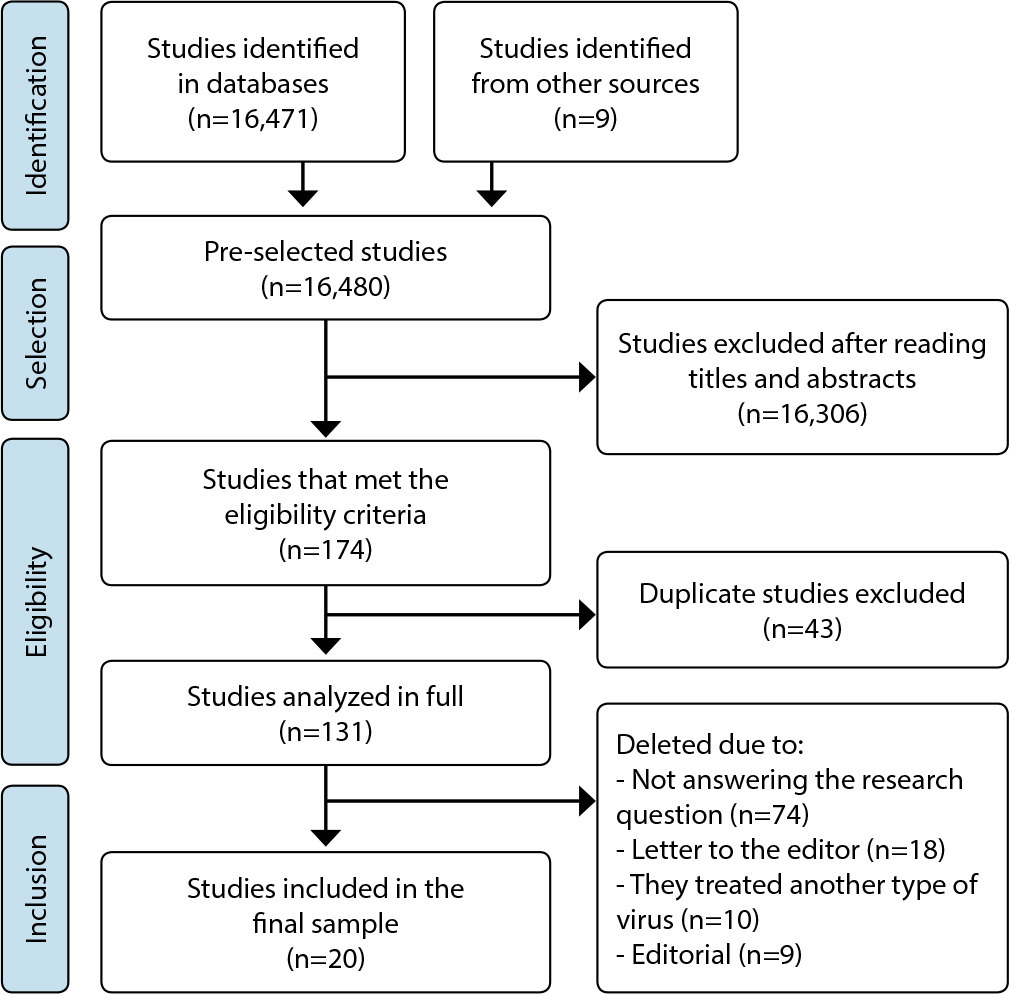-
ORIGINAL ARTICLE
Evaluation of care for people with HIV in Primary Health Care: construct validation
Revista Brasileira de Enfermagem. 2024;77(6):e20230190
01-13-2024
Resumo
ORIGINAL ARTICLEEvaluation of care for people with HIV in Primary Health Care: construct validation
Revista Brasileira de Enfermagem. 2024;77(6):e20230190
01-13-2024DOI 10.1590/0034-7167-2023-0190
Visualizações0ABSTRACT
Objectives:
to verify the construct validation of an instrument for evaluating care for people living with HIV in Primary Health Care.
Methods:
methodological study carried out in 2021 with 260 health professionals in Recife, PE. Validation based on the internal structure was carried out at this stage using exploratory and confirmatory factor analysis, and validity based on item response theory.
Results:
the validation determined the retention of five factors and 63 items. The instrument’s internal consistency and quality of fit was 0.90, the Tukey-Lewis index was 0.915 and the comparative fit index was 0.918 in the confirmatory factor analysis. The indication for the absolute majority of items is adequate fit.
Conclusions:
the instrument has construct validity, making it possible to use it to evaluate the decentralization process and care for People Living with HIV in Primary Health Care.
Palavras-chave: Acquired Immunodeficiency SyndromeComprehensive Health CareHIVPrimary Health CareProgram EvaluationVer mais
-
ORIGINAL ARTICLE
Nurses’ experiences in caring for people with mental health problems hospitalized due to clinical comorbidities
Revista Brasileira de Enfermagem. 2024;77(5):e20230136
12-13-2024
Resumo
ORIGINAL ARTICLENurses’ experiences in caring for people with mental health problems hospitalized due to clinical comorbidities
Revista Brasileira de Enfermagem. 2024;77(5):e20230136
12-13-2024DOI 10.1590/0034-7167-2023-0136
Visualizações0Ver maisABSTRACT
Objectives:
to understand nurses’ experiences in caring for people with mental health problems hospitalized due to clinical comorbidities in non-psychiatric Inpatient Units.
Methods:
qualitative study, guided by Alfred Schutz’s social phenomenology. Sixteen phenomenological interviews were conducted. The content was analyzed and discussed based on the literature, through the composition of three categories of analysis.
Results:
three categories emerged in the study: Challenges in care faced by nurses; Fragmented care action; and Ideal care. The disarticulation of the clinic was revealed, as described by nurses, showing care as an action far removed from the comprehensiveness of a person. Nurses’ performance is guided predominantly by biomedical reference, disregarding appreciation of subjectivity.
Final Considerations:
it was observed that nurses attribute the responsibility for patient care to factors external to their life-world, when, in fact, these aspects should be components that help them in comprehensive care construction.
-
ORIGINAL ARTICLE
Primary Health Care in transitional care of people with stroke
Revista Brasileira de Enfermagem. 2024;77(3):e20230468
07-29-2024
Resumo
ORIGINAL ARTICLEPrimary Health Care in transitional care of people with stroke
Revista Brasileira de Enfermagem. 2024;77(3):e20230468
07-29-2024DOI 10.1590/0034-7167-2024-0468
Visualizações0ABSTRACT
Objectives:
to understand the role of Primary Health Care teams in caring for people with stroke after hospital discharge.
Methods:
single case study, with integrated units of analysis, with a qualitative approach. Data triangulation occurred through interviews with professionals and family caregivers involved in transition of care, in addition to direct observations in rounds and document analysis. For the analyses, the analytical strategies of theoretical propositions and construction of explanations were used, with the help of ATLAS.ti®.
Results:
the importance of counter-referral, the role of community health workers and the multidisciplinary team, health promotion, secondary prevention, home visits as a visceral attribute and nurses as care managers are evident.
Final Considerations:
the high demand on teams and the Social Determinants of Health interfere with adequate continuity of care. Transitional care programs that enable continuity of care are recommended.
Palavras-chave: Comprehensive Health CareContinuity of Patient CarePrimary Health CareStrokeTransitional CareVer mais -
ORIGINAL ARTICLE
Factors associated with the time to treat breast cancer in the pandemic period: an observational study
Revista Brasileira de Enfermagem. 2023;76(Suppl 1):e20220428
08-07-2023
Resumo
ORIGINAL ARTICLEFactors associated with the time to treat breast cancer in the pandemic period: an observational study
Revista Brasileira de Enfermagem. 2023;76(Suppl 1):e20220428
08-07-2023DOI 10.1590/0034-7167-2022-0428
Visualizações0Ver maisABSTRACT
Objectives:
to analyze the factors associated with the time to surgical treatment for breast cancer in patients seen at a reference mastology outpatient clinic in the State of Ceará.
Methods:
analytical, longitudinal study with medical charts from the Mastology Outpatient Clinic of Assis Chateaubriand Maternity School. We used 140 medical charts of breast cancer patients with surgeries performed during the pandemic.
Results:
the study evidenced associations between schooling and shorter time to treatment in patients who underwent biopsy before the first outpatient visit (p = 0.026; OR: 0.16; CI = 0.03-0.85); in the group who had the biopsy performed by the outpatient clinic, was associated the type of tumor (p = 0.019) and neoadjuvant therapy (p = 0.000).
Conclusions:
the lesser educational level, tumor type, and use of neoadjuvant therapy were factors associated with the time to treatment during the pandemic period.
-
REVIEW
Elements for assistance to patients with hematological malignancies to propose care lines: a scoping review
Revista Brasileira de Enfermagem. 2023;76(2):e20220152
02-06-2023
Resumo
REVIEWElements for assistance to patients with hematological malignancies to propose care lines: a scoping review
Revista Brasileira de Enfermagem. 2023;76(2):e20220152
02-06-2023DOI 10.1590/0034-7167-2022-0152
Visualizações0ABSTRACT
Objectives:
to identify the elements for assistance to patients with hematological malignancies to propose a care line.
Methods:
this is a scoping review, anchored in the JBI theoretical framework, with searches carried out in April 2021, in eight electronic databases and 10 repositories of theses and dissertations.
Results:
the final sample consisted of 93 studies, and the main forms of assistance provided that can support a care line for this public were imaging tests, immunophenotyping, chemotherapy regimens, radiotherapy, infection management, assessment of nutritional status, maintenance of oral function, symptom management and screening for second malignancies.
Conclusions:
the elaboration of a care line for onco-hematologic patients is necessary, considering the complexity surrounding the diagnosis and treatment of hematologic malignancies, in addition to the difficulties that are imposed in relation to access and continuity of care in the network.
Palavras-chave: Comprehensive Health CareHematologic NeoplasmsNeoplasmsPatient Care PlanningPatientsVer mais
-
REVIEW
Onco-hematological patient care in times of COVID-19: a scoping review
Revista Brasileira de Enfermagem. 2022;75(Suppl 2):e20210892
09-19-2022
Resumo
REVIEWOnco-hematological patient care in times of COVID-19: a scoping review
Revista Brasileira de Enfermagem. 2022;75(Suppl 2):e20210892
09-19-2022DOI 10.1590/0034-7167-2021-0892
Visualizações0Ver maisABSTRACT
Objective:
to identify and map health care aimed at onco-hematological patients in times of Coronavirus 2019.
Methods:
this is a scoping review, anchored in the Joanna Briggs Institute theoretical framework, registered in the Open Science Framework, with searches carried out in June 2021, through searches in the databases.
Results:
a final sample consisting of 20 articles was obtained, with emphasis on general care, treatment and stem cell donation. The most reported care was the use of telemedicine, screening for Coronavirus Disease 2019, compliance with prevention practices and, in case of infection, postponing procedures.
Conclusions:
the study gathered the main evidence on care aimed at treating these patients in times of a pandemic. Such measures help in the clinical management with the objective of proceeding with treatment amidst the injuries caused, thus minimizing possible complications.

-
ORIGINAL ARTICLE
Women who live in mining on the French-Brazilian border: daily challenges
Revista Brasileira de Enfermagem. 2022;75(6):e20210688
08-22-2022
Resumo
ORIGINAL ARTICLEWomen who live in mining on the French-Brazilian border: daily challenges
Revista Brasileira de Enfermagem. 2022;75(6):e20210688
08-22-2022DOI 10.1590/0034-7167-2021-0688
Visualizações0Ver maisABSTRACT
Objectives:
to describe the daily life of Brazilian women who work in mining.
Methods:
a descriptive, qualitative study, with analysis based on the theory of Symbolic Interactionism. Non-participant observations, field diary writing, sociodemographic form, non-directive interviews, recorded and transcribed in full, were carried out with 19 women who work in mining areas on the French-Brazilian Amazon border.
Results:
two categories emerged: Life trajectories: women’s work in mining; Woman, mother and prospector: the multiple facets of gender inequality on the Amazon border.
Final Considerations:
assessing the daily experiences of women in the Amazonian mines allowed identifying their health needs, evidencing the need to direct and implement public and social policies and health practices for comprehensive care of these women’s health.
-
ORIGINAL ARTICLE
Breastfeeding and diseases prevalent in the first two years of a child’s life: a cross-sectional study
Revista Brasileira de Enfermagem. 2022;75(6):e20210534
06-06-2022
Resumo
ORIGINAL ARTICLEBreastfeeding and diseases prevalent in the first two years of a child’s life: a cross-sectional study
Revista Brasileira de Enfermagem. 2022;75(6):e20210534
06-06-2022DOI 10.1590/0034-7167-2021-0534
Visualizações0ABSTRACT
Objectives:
to assess the association between breastfeeding and diseases prevalent in the first two years of a child’s life.
Methods:
a retrospective cross-sectional study that analyzed electronic medical records of 401 children. Data on birth, growth, breastfeeding and medical care in the first two years of life were collected. In the analysis, Poisson regression with robust variance was used.
Results:
27.9% of children were exclusively breastfed until six months, and, at 24 months, 93.3% had already had some prevalent childhood disease. In the crude analysis, 5-minute Apgar association, length, weight at 12 months, exclusive and non-exclusive breastfeeding time had association. In the adjusted analysis, only the variable breastfeeding at six months maintained the association with prevalent childhood diseases.
Conclusions:
children who were not breastfed, exclusively or not, up to six months of age, had a higher prevalence of diseases compared to breastfed children.
Palavras-chave: Breast FeedingChild Health ServicesComprehensive Health CareEducationIntegrated Management of Childhood IllnessNursingVer mais



